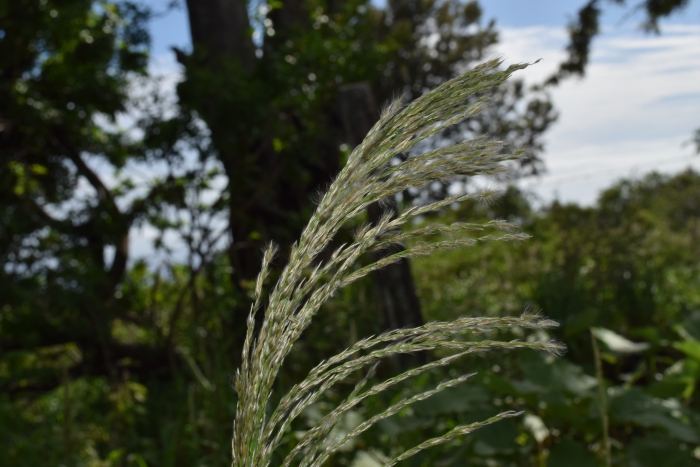Sourgrass
(Digitaria insularis)
Sourgrass (Digitaria insularis)
/
/

stinger
CC BY 4.0
Image By:
stinger
Recorded By:
Copyright:
CC BY 4.0
Copyright Notice:
Photo by: stinger | License Type: CC BY 4.0 | License URL: http://creativecommons.org/licenses/by/4.0/ | Rights Holder: stinger | Publisher: iNaturalist | Date Created: 2021-03-10T21:09:25-08:00 |



























Estimated Native Range
Summary
Digitaria insularis, commonly known as Sourgrass, is a perennial grass that exhibits both deciduous and semi-deciduous characteristics depending on the climate. It is native to tropical savannas and grasslands in Latin America, including Mexico, Central America, and Northern South America. This grass typically reaches heights of 3-5 feet and spreads 4-6 feet wide. It forms dense clumps and has a coarse texture with flat, wide leaves and a distinctive purplish inflorescence that appears during its flowering season.
Sourgrass is valued for its rapid growth and adaptability to various soil types, making it useful for erosion control and as a forage plant in its native range. However, its aggressive growth can be problematic, and it is considered invasive in some regions outside its native habitat. In cultivation, it requires full sun to part shade and moderate watering, thriving in soils with good drainage. Gardeners should be cautious and consult local regulations before planting to prevent unwanted spread.CC BY-SA 4.0
Sourgrass is valued for its rapid growth and adaptability to various soil types, making it useful for erosion control and as a forage plant in its native range. However, its aggressive growth can be problematic, and it is considered invasive in some regions outside its native habitat. In cultivation, it requires full sun to part shade and moderate watering, thriving in soils with good drainage. Gardeners should be cautious and consult local regulations before planting to prevent unwanted spread.CC BY-SA 4.0
Plant Description
- Plant Type: Grass
- Height: 3-5 feet
- Width: 4-6 feet
- Growth Rate: Moderate
- Flower Color: N/A
- Flowering Season: Summer
- Leaf Retention: Deciduous, Semi-Deciduous
Growth Requirements
- Sun: Full Sun, Part Shade
- Water: Medium
- Drainage: Fast
Common Uses
Erosion Control, Low Maintenance
Natural Habitat
native to tropical savannas and grasslands in Latin America, including Mexico, Central America, and Northern South America
Other Names
Common Names:
Scientific Names: , Digitaria insularis, Trichachne insularis, Tricholaena insularis, Andropogon insulare, Panicum leucophaeum, Panicum insulare, Andropogon insularis, Milium villosum, Valota insularis
GBIF Accepted Name: Digitaria insularis (L.) Mez ex Ekman